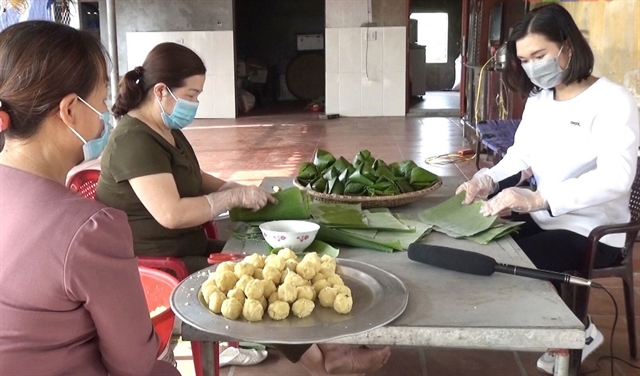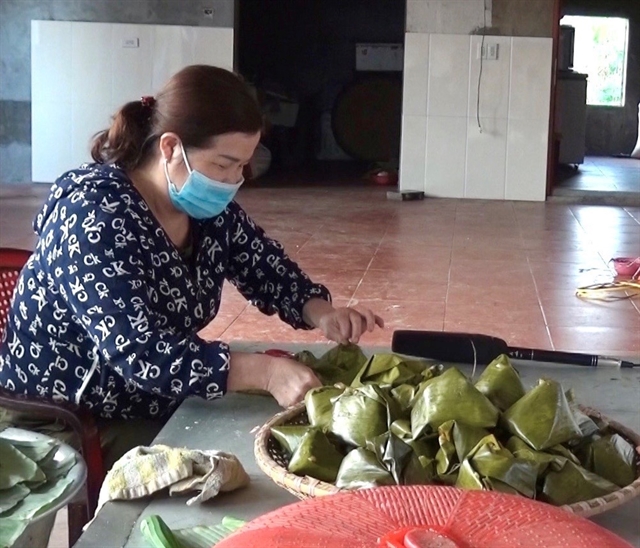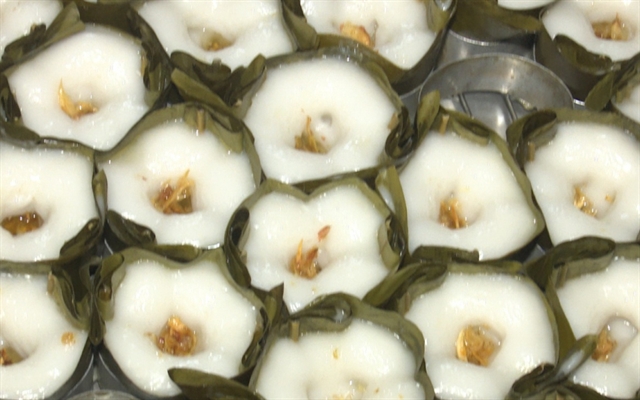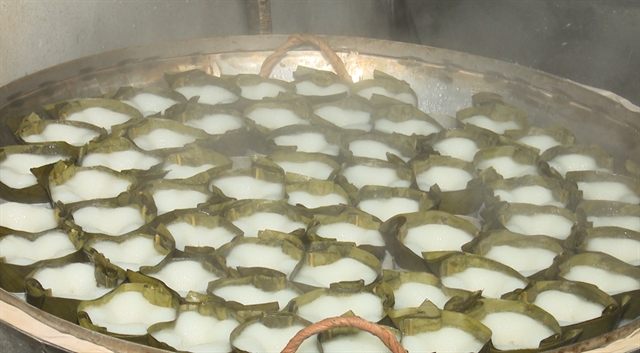Quý Dương
Molasses glutinous rice cake (locally known as bánh mật) is among many special dishes of Bách Thuận Village that helps to put Thái Bình Province on the map as a traditional cuisine centre.
This ancient village, also well known for its bonsai trees, welcomes hundreds of visitors and travellers every year to enjoy its beautiful landscapes and local specialities like bánh mật and bánh bèo (fern-shaped cake) that have been handed down by ancestors for a century, said 90-year-old village elder Hoàng Thị Đào.

Bách Thuận villagers wrapping bánh mật (molasses glutinous rice cake). Photo vuthu.thaibinh.gov.vn
Đào said for her villagers, bánh mật, like bánh chưng (glutinous rice square cake), is an important offering to the family altar to worship ancestors during the Tết (Lunar New Year) holiday.
Making the cake is not difficult but it requires attention and passion because to make a quality and tasty cake, all stages should ensure hygiene and food safety, she said.
The first step is to choose new glutinous rice which is fragrant and soft compared with others. This kind of rice is the main ingredient to determine the cake’s characteristics, Đào said.

Bánh mật is more enjoyable when eaten cool. Photo vuthu.thaibinh.gov.vn
The rice should be washed and soaked in water for eight hours before being ground and pressed for six hours. After that the dough is mixed with molasses or brown sugar and kneaded until it becomes smooth.
The dumpling includes green beans that still have the pods, soaked in water for five hours, then steamed and ground before being mixed with molasses and coconut threads. They are kneaded to become a small ball.
The well-kneaded dough should be cut into a small ball the size of a chicken egg then stuffed with green beans and wrapped in banana leaves before being steamed for 45 minutes, said Đào.
The cake is more enjoyable when eaten cool, she said, adding that the cake is made year round “but for Tết we often receive a lot of orders from customers inside and outside the province for our cake”.
A Hà Nội resident, Nguyễn Thu Hằng, told Việt Nam News that her family likes bánh mật very much, so every year she travels to Bách Thuận Village in Thái Bình’s Vũ Thư District before Tết to enjoy the cake and also the beauty of different flowers and bonsai.
“The cake is delicious thanks to the new glutinous rice, rich buttery fat from green beans, and scent of banana leaves," Hằng said, adding that she often buys several hundred cakes as gifts for her relatives and friends in Hà Nội. The cake can be preserved in the refrigerator to be eaten after Tết as breakfast.
Bánh bèo (fern-shaped cake)

Thái Bình's traditional bánh bèo (fern-shaped cake) is different from the version in Huế City. Photo thaibinh.tv.vn
This Vietnamese cake is sourced from the central region such as Huế City, but Bách Thuận villagers have made their own traditional bánh bèo wrapped in dong, a kind of wild forest leaf. Its filling is made of minced pork shoulder, dried onions, pepper and chili.
Huế bánh bèo is made by putting dough, that is mixed with rice and cassava starch, in a small bowl or plate before steaming. Its filling is shrimp, garlic, fresh onion and others.
Trịnh Thị Huyền, 50, said the cake was made by her great grandmother five or six decades ago. It is made of ordinary rice which is soaked in water for an hour in summer and another half an hour in winter. The secret is ensuring the dough isn't sour.

Diners never forget the taste of the cake when dipping it in quality fish sauce mixed with chilli, lime juice and pepper. Photo thaibinh.tv.vn
An experienced maker likes her knows well the exact time to use the soaked rice for grinding and then pressing it to become half dried dough which is kneaded into a duck egg before using wild leaf to wrap it. “We use a steamer to cook the cake to ensure its quality.”
An overseas Vietnamese living in Germany, Phan Thị Thuận, who is originally from Bách Thuận Village, said: “I miss the cake so much because it reminds me of my childhood with all my family members sat around a tray of tasty and attractive bánh bèo made by my mother during the Tết holiday or when my parents welcome dear guests.” VNS
OVietnam